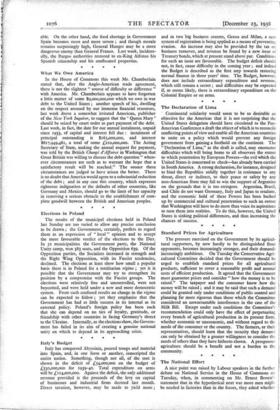The Declaration of Lima Continental solidarity would seem to be
so desirable an objective for the Americas that it is not surprising that the United States delegation should have circulated to the Pan- American Conference a draft the object of which is to reconcile conflicting points of view and enable all the American countries to unite on a policy which would prevent any foreign government from gaining a foothold on the continent. The " Declaration of Lima," as the draft is called, may encounter difficulties which will bring home to all observers the extent to which penetration by European Powers—the evil which the United States is concerned to check—has already been carried in South America. A strong declaration, for instance, designed to bind the Republics solidly together in resistance to any threat, direct or indirect, to their peace or safety by any non-American State may fail to win the support of Argentina on the grounds that it is too stringent. Argentina, Brazil, and Chile do not want Germany, Italy and Japan to retaliate, and the economic hold of these Powers has been backed up by commercial and cultural penetration to such an extent that Washington will have to do more than voice its aspirations to turn them into realities. To do this, however, the United States is sinking political differences, and thus increasing the chances of success.
* * * *


































 Previous page
Previous page